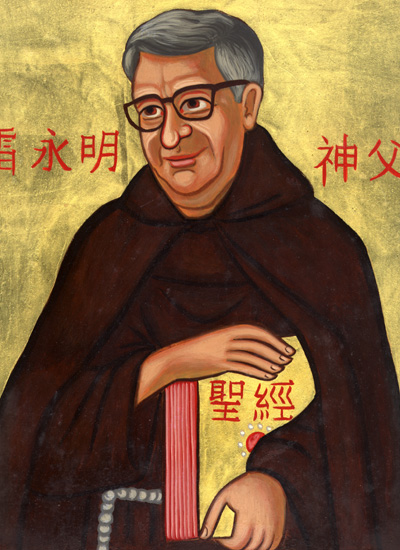
“I see Scotus as the Doctor of the Immaculate Conception, of Christ as King of the universe, of the Church as the bride of Christ, as a defender of Christ’s Vicar on earth, as a theologian of the mystery of the Eucharist.”
— Bl. Gabriel M. Allegra, OFM
With the recent beatification of Fr. Gabriel Mary Allegra, OFM, I have taken it upon myself to translate some pertinent passages from the Italian original of his book on the absolute primacy of Christ Il primato di Cristo in San Paolo e Duns Scoto (Edizioni Porziuncola, 2011) from dialogues he had with Fr. Pierre Teilhard de Chardin, S.J., in 1942-1945; the text was first published in 1966. I have limited myself to the passages directly related to the primacy and have deliberately left out the sections on Dante Alighieri and the conversational parts with Fr. Pierre Teilhard de Chardin, S.J., both for the sake of brevity and clarity. I have included page numbers of the original Italian text in case anyone needs the references. [Regarding Fr. Pierre Teilhard de Chardin, S.J., I would highly recommend a reading of Dr. Dietrich von Hildebrand’s solid evaluation]
Enjoy Bl. Gabriel Allegra’s pedagogical presentation of the doctrine of the absolute primacy of Christ which is both profound and simple!
In Corde Matris,
Fr. Maximilian M. Dean
Il primato di Cristo in San Paolo e Duns Scoto
(Edizioni Porziuncola, 2011)
by Blessed Gabriel M. Allegra, OFM
Translation of pertinent passages:
Section I
p.31
If I am not mistaken, the Franciscans have remained almost the only ones in the defense of the absolute Primacy of Christ, or rather of the doctrine of the Incarnation not occasioned by sin. A few years ago our Father General [Fr. Ephrem Longpré, OFM] sent out an Encyclical Letter to the entire Order in which, besides exposing this heavenly doctrine, he invited the Friars Minor once again to teach, propagate and defend it. This Letter is enriched with erudite and solid footnotes which give further evidence as to how there has never been lacking at the side of the manualistic teachings, nor shall there be lacking today in the Church, thinkers, mystics and saints who accept and defend the Kingship or Absolute Primacy of Christ; I have found that even Anglican exegetes, like the renowned Wescott, based on the words of Scripture, and especially those of St. Paul, uphold this and are moved with enthusiasm…
Here is what I can say regarding the Orthodox Theologians, or better Fathers, based on the citations of the Encyclical Letter of my Father General: because of their theory of the deification of humanity through the Incarnation, they either clearly or implicitly subordinate the Redemption to the Incarnation, since the Incarnation itself gives glory to God and divinizes the cosmos…
p.32
…the doctrine of the absolute Primacy of Christ is not as rare as the Dogmatic Manuals are teaching; to the contrary, it is anchored in the great Tradition of the ancient Church. Illustrious Fathers like St. Irenaeus, St. Athanasius, St. John Chrysostom, St. Cyril of Alexandria, Anastasius of Sinai, Isaac of Nineveh… have upheld it. But as I see it many of these famous witnesses of Tradition, and I place among them the greatest of them all, St. Augustine, did not make a synthesis of the doctrine of the Incarnation independent of sin and that of the redemptive Incarnation, with the exception of the attempt of that powerful genius Rupert of Deutz.
Unfortunately, after Rupert the doctrine of the absolute Primacy of Christ was proposed, not as a revealed datum, but rather as a hypothesis: If Adam had not sinned, would the Word have become incarnate? And to this question the greatest luminaries of the Scholastic period, Ss. Thomas and Bonaventure, opposing their respective Masters St. Albert the Great and Alexander of Hales, responded no, even if both of them championed the principles which, solicited and pushed to their legitimate consequences, would postulate the doctrine of the Primacy…
p.33
If one now reflects on the influence which is exercised especially by St. Thomas in Catholic Schools, one cannot be but surprised at the levity with which the discussion is treated by the authors of the manuals. They frequently give the impression that they do not suspect that anything more is being dealt with than a mere question of devotion, as opposed to dealing with the greatest glory of Christ and most probably – for me it is certain – a revealed datum found in the Sacred Scriptures and the Holy Fathers and Doctors.
p.35
The Sacred Scripture teaches the absolute Primacy of Christ just as it teaches the existence of another end of the Incarnation, namely the Redemption of the human race. The Fathers sustained the Primacy and the Redemption without attempting a synthesis, that is, without coordinating a harmonious system of the two truths… St. Thomas and St. Bonaventure taught that the primary end of the Incarnation was that of the Redemption and their authority, especially that of St. Thomas, has indeed made such a doctrine become quasi-official. Venerable John Duns Scotus, just as he did with the doctrine of the Immaculate Conception, rose up against many Masters and attempted a synthesis. It seems to me that no one who has followed him has really added anything new to the arguments of the Marian Doctor, although admittedly the French School of Spirituality has treated of the extreme consequences of the brilliant Scotistic sentence: Deus voluit ab alio summe diligi, and St. Francis de Sales has dealt with the extreme consequences of that other Scotistic principle: Deus est formaliter charitas.
